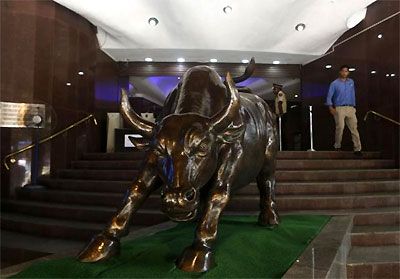The second half of June could be driven more or less by technical factors triggered by news flow from Greece, the US Federal Reserve and the monsoon. The technical picture seems bearish as of now, says Devangshu Datta.
 The Reserve Bank of India (RBI) successfully confounded the stock market with its latest policy review. It announced a 25-basis point cut in the repurchase rate, thus meeting consensus expectations (and disappointing the few super-optimists hoping for a 50-basis point cut. However, RBI Governor Raghuram Rajan made several hawkish points even as he delivered the good news.
The Reserve Bank of India (RBI) successfully confounded the stock market with its latest policy review. It announced a 25-basis point cut in the repurchase rate, thus meeting consensus expectations (and disappointing the few super-optimists hoping for a 50-basis point cut. However, RBI Governor Raghuram Rajan made several hawkish points even as he delivered the good news.
First, he implied this could be the last cut in a while. The central bank has sliced 75 basis points off the repo in 2015. Second, he admitted to worries about a deficient monsoon, which might cause food shortages and hence, require adroit government management to avert a spike in inflation. He also pointed out that crude prices have stabilised and could harden. Third, he was cautious about volatility in international markets.
The stock market nosedived on heavy FII equity selling, coupled with bond market selling and exits by local operators. There has been an interesting change in institutional attitudes. Morgan Stanley offered a very positive outlook on India but it is an outlier now.
Foreign portfolio investors (FPIs) have been net equity sellers since April (discounting the Daiichi-Sun Pharma deal), while domestic institutional investors (DIIs) have been consistent buyers. This reverses the pattern of the 2014-15 fiscal when the FPIs were very positive, while DIIs were net sellers.
There was reasonably positive news on the macro-economic front. The Index of Industrial Production (IIP) rose to 4.1 per cent year-on-year (y-o-y) in April 2015, up from 3.7 per cent y-o-y in March 2015. The IIP has now been positive for six months in succession and it beat consensus expectations of 1.6 per cent in April by a considerable margin.
The consumer price index was up by 5.01 per cent in May, higher than the 4.87 per cent y-o-y rise recorded in April. Most of the rise came from higher energy costs. The current account deficit has fallen to only 0.2 per cent of GDP.
On the external front, Greece continues to be a source of concern. The International Monetary Fund has pulled out of Greek negotiations. There is fear that talks of cash-for-reforms may break down. Every rumour will cause swings. As of now, European stocks are at multi-year highs.
European Central Bank (ECB) President Mario Draghi recently said he thinks the ECB’s Quantitative Expansion Programme is working, while issuing a warning that volatility would continue. The ECB also raised its euro zone inflation estimate to 0.3 per cent, which is not a bad thing.
The Federal Open Markets Committee has a keenly awaited meeting this week. Traders apprehend that the US Federal Reserve might hike US policy rates in September itself. There was a strong jobs report in May, beating consensus comfortably and indicating the US economy continues to expand. This was buttressed by positive retail sales reports for May. So, a hike cannot be too far away.
In Asia, the Chinese macro-economic slowdown continues. But the Chinese stock market has done well, especially the IPO market. As and when, the MSCI does include Chinese shares in its emerging market benchmark share indices, there would surely be an enhancement of FPI flows into China.
The second half of June could be driven more or less by technical factors triggered by news flow from Greece, the Fed and monsoon. The technical picture seems bearish as of now. The major indices – the Sensex and Nifty – have broken down below their own 200-day moving averages, which is usually a sign of a bearish long-term trend.
Market breadth is negative with declining shares outnumbering advances. A drop below the psychological level of Nifty 8,000 could trigger some more selling. Worryingly, bond yields have risen after the June 2 rate cut, implying that the financial community is unhappy at the moment. This could mean serious losses on bank treasury portfolios.
There might be a hiatus in political news flow for a while since the Monsoon session of Parliament is not due to start till August. By then, the monsoon scenario will have clarified and so, one hopes, will Greece. The Fed may also have come through with a timetable for its next hike by then. The pattern of Q1 corporate earnings will also be clearer. A recovery may also be on the cards by then if the monsoon is kind.








 © 2025
© 2025